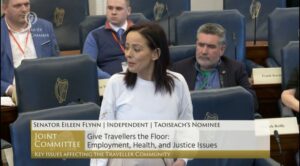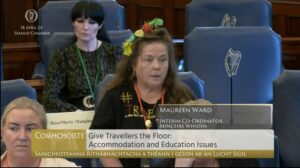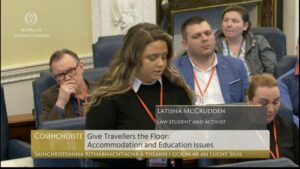Pavee Point was delighted to participate at ‘Give Travellers the Floor’ today, a day of Traveller and Roma representation in the Seanad for the very first time. It was organised by The Joint Committee on Key Issues affecting the Traveller Community, and had members of different Traveller Organisations attend the roundtable discussion on key issues affecting the community. Committee Cathaoirleach Senator Eileen Flynn said: “The Committee looks forward to this public meeting titled ‘Give Travellers the Floor’. This meeting, which will take place in the Seanad Chamber, will give representatives of the Traveller Community the chance to voice their views on the State’s policies in respect of a variety of subjects which impact upon the lives of Travellers. The diverse array of speakers from the Traveller community will discuss subjects such as access to culturally appropriate accommodation; access to healthcare, including mental health services; education, including further and higher education; youth issues; and disability rights and more.”
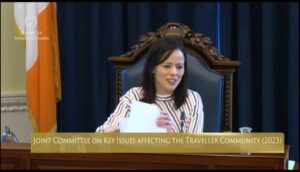



Taking place in the Seanad, Pavee Point Traveller & Roma Centre and other Traveller Organisations provided inputs on the issues facing the Travellers, such as accommodation, education, employment health & justice.
Pavee Point Traveller and Roma Centre were represented by Patrick Reilly, Mental Health Coordinator and Gabi Muntean, Roma Employment Worker, both spoke on the day
Speaking on health issues affecting the Traveller Community, Patrick Reilly stated that: ‘We know that 90% of what affects a person’s health happens outside of the medical system- that means living conditions, poverty, employment, educational attainment, racism and discrimination all affect Travellers’ health outcomes. Travellers health is affected by Travellers not getting jobs, not being supported in school and living in bad conditions, with no services. If we are to realistically address Traveller health inequalities, other Government Departments have to also address the determinants.’
Reilly referenced the All Ireland Traveller Health Study, noting that the evidence of the study was clear in showing Traveller Health Inequalities and systemic racism within our health services: “Less than half of all Travellers had complete trust in health care professionals compared to the trust level found in the general population, and 40% of Travellers reported discrimination accessing health services which was supported by almost 7 out of 10 of service providers who agreed that their services discriminated against Travellers”.

Reilly also touched on the funding concerns surrounding the implementation of the National Traveller Health Action Plan, and the burnout of the Traveller Community Health Workers, stating that “there is an urgent need for new core funding to implement the Plan. Traveller organisations and Primary Health Care Projects can’t realistically be expected to deliver on these actions with once-off funding and without any additional core funding. Traveller Community Health Workers, mostly Traveller women, who employed by these projects, are working on the minimum wage, for 12 hours a week and expected to deliver on a range of actions while also responding to emerging issues on the ground. These workers are living and working within the community and work far beyond the 12 hours in which they are paid. We are seeing good workers leave the sector as a result and there is an urgent need to address this.”
Gabi Muntean raised Roma Health inequalities, stating that “many Roma are not able to access a GP or have a medical card. Maternal health is another area where work needs to be done with 24% of Roma households saying that women had not accessed a doctor or hospital while pregnant”. It was also noted that Gabi was also the first Roma woman to speak in the House of Oireachtas. It is a momentous occasion and hopefully the first of many attendances for Roma in Ireland.
Gabi Muntean also highlighted racism and discrimination that the Roma community face daily, and highlights the urgent need for the current Hate Crime Speech Bill to be passed: “Roma are often targeted for significant amount of discrimination and racism. For example, Roma were one of the groups targeted by the far right on social media after the after the riots in Dublin City in November 2023 to stir up hatred and racism. This was a difficult time for Roma in Dublin and elsewhere, especially Roma women – many of whom were afraid to go out on the streets for weeks after those frightening events. Roma are also often the target of racist online hate speech. Hate speech against Roma can be extreme with death threats against Roma, references to extermination and shocking verbal abuse. This is why we are very concerned that the current Hate Crime Hate Speech Bill completes its course through the Seanad as soon as possible.”
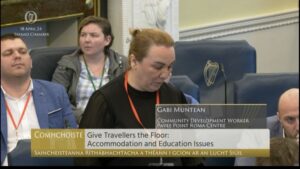
She also noted findings of the 2018 Roma Needs Assessment, which showed the high levels of discrimination in accommodation and the shocking living conditions of Roma, with 12% having no kitchens, 13% having no fridge & 1/4 households with 8 or more people and under half not having enough beds.

We thank the members of the Committee and Senator Eileen Flynn for the opportunity to address members of the Seanad and hope to see some positive change as a result of this historic day.


